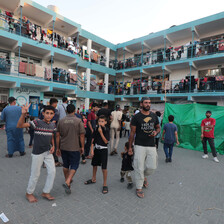The Electronic Intifada 28 February 2014

Palestinian refugees in Syria in 1948. Many Palestinians have faced multiple displacements since their families’ first exile from their homeland.
UN PhotoMuhammad is a second generation Palestinian refugee with a very tragic story of displacement and alienation.
He was born and grew up in Iraq to a displaced Palestinian family from the village of Aqir in historic Palestine.
On 4 May 1948, Aqir was invaded by a Zionist militia that killed and kidnapped residents and destroyed homes. The majority of the villagers fled and the remainder were expelled a few weeks later.
By December, desperate to halt the return of the expelled Palestinians, the nascent Israeli army had already settled newly arrived Jews into the villagers’ homes, as the historian Benny Morris documented in his book The Birth of the Palestinian Refugee Problem Revisited.
Today, Aqir is known by Israelis as Kiryat Ekron.
Listening to Muhammad, who asked that his full identity not be revealed for safety reasons, brought the words of the Palestinian novelist Ibrahim Nasrallah to my mind: “We should have had bigger hearts to contain all this tragedy.”
The story of Palestine starting from 1948 until now is contained in Muhammad’s story.
“Dying in the desert”
After the United States led the invasion of Iraq in 2003, Muhammad moved to Jordan. There, he got stuck in the desert for four months at al-Rweished refugee camp on the Iraqi-Jordanian border.
This slim man, apparently in his forties, lost his eldest son who suffered from leukemia while in the refugee camp. Muhammad eventually managed to get into Jordan since he is married to a Palestinian-Jordanian.
“The story created a great fuss in the media and media outlets started talking about a kid of a Jordanian dying in the desert,” the man recalled.
Under Jordanian law, the non-Jordanian male spouses of Jordanian women do not acquire citizenship and the residency rights that come with it, however, Palestinians in the camp married to Jordanians were given a royal exception and allowed into the country, while other Palestinians were left stranded in the desert for four years.
Most of the refugees were eventually exiled to Brazil. The situation in Jordan was not good and Muhammad had to struggle to find a job to feed his family. Going back to Iraq was his only option — yet it was not a good one.Sectarian infighting in the wake of the US-led invasion made it impossible for him to work and live in Iraq. In 2006 Muhammad and his family moved to Syria.
Yet the Syrian crisis that began in March 2011 displaced his family once again.
In November 2013, as Muhammad was looking for food, he was stopped at a checkpoint and apprehended by the Syrian army.
Tortured in prison
Muhammad was tortured for forty days and he lost 30 kilograms (65 pounds) of his bodyweight.
When I met him in, Muhammad described this critical period in prison. He spoke of great misery and extremely cramped conditions: “We would squeeze ourselves to give more space to injured inmates.”
After forty days, Muhammad was given two options: to be sent to an Iraqi prison, since he was born there, or to be deported to any country that would accept him.
His wife had to sell her gold to purchase a plane ticket in addition to paying some bribes to security officers. Egypt refused to allow him into Gaza because he does not hold a Palestinian ID number (such numbers are issued by Israel, via the Palestinian Authority), although he holds a Palestinian passport issued by the PA.
A call from Gaza
Hisham, a Palestinian student in Kuala Lumpur received a call from his Gaza family telling him about a Palestinian travelling from Syria whose mother happened to be living next to the student’s family’s house in Gaza, who was expected to arrive in Malaysia the next day.
Hisham rushed to the airport the next day with a banner on which he wrote Muhammad’s full name. As they waited at the arrival hall, a man waved to them. It was Muhammad.
He stayed with a group of Palestinians and it is in Malaysia that I met him. Once Muhammad settled in, he called his family in Syria, Palestine and Iraq. Then he started making calls to embassies all over the world to give him a visa. None offered him one.
He overstayed in Malaysia and had to pay a heavy fine. He was denied entry into Malaysia for two years and given one week to leave the country. Meanwhile, his brothers in Iraq managed to get him a visitor’s permit.
Bitterness
Muhammad spoke of the situation of Palestinians with bitterness: “When the crisis began in Syria, Palestinians paid dearly. Part of the Syrian people accused us of supporting the Syrian regime, and another group accused us of treason and betraying the regime.”
With help, Muhammad booked his flight to Iraq and arrived there in February.
Thinking of his family in Syria, his future, his options, his displacement and his destiny as a Palestinian, Muhammad understands it all.
His dad was kicked out of his original village in Palestine by Zionist gangs and he was born in exile.
He knows about the reality of displacement, the guilt of being Palestinian, his son dying in the desert, his family stranded in Syria, torture in a Syrian prison. He knows about passports, a lost homeland.
He knows about what it is like to have nowhere on earth to go.
Meanwhile, his family will remain separated, with him and his brothers in Iraq, his kids and wife in Syria and his mum and heart in Palestine.
Yousef M. Aljamal is a Gaza-based translator and blogger. He co-translated The Prisoners’ Diaries: Palestinian Voices from the Israeli Gulag. His website is www.yeljamal.wordpress.com. He can be followed on Twitter: @YousefAljamal.





